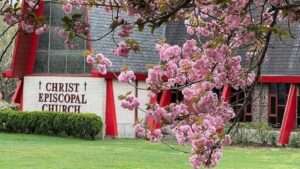The Volokh Conspiracy
Mostly law professors | Sometimes contrarian | Often libertarian | Always independent
New Jersey Town Drops Plan to Condemn a Church to Build a Park and Pickleball Courts
The mayor abandoned the plan after it aroused strong political resistance and threats of litigation.

I have previously written about how the town of Toms River, New Jersey, planned to use eminent domain to condemn the Christ Episcopal Church and build a park and pickleball courts on the spot. The plan seems to have been motivated by a desire to prevent the church from building a homeless shelter on part of its property. In late July, the mayor postponed a scheduled vote on the plan, after it met with widespread opposition, and leading public interest firms specializing in property rights issues (such as the Institute for Justice and the Pacific Legal Foundation) offered to represent the Church in potential legal challenges to the taking. The Becket Fund for Religious Liberty offered to help bring a case under the RLUIPA statute. I outlined some possible grounds for such a challenge here.
Last week, the mayor announced that the plan is being abandoned completely:
His announcement came during the New Jersey town's council meeting's public comment time when a speaker asked him to stop the seizure. He responded that a poll he commissioned showed that "it's pretty clear that the public does not support the eminent domain. We thought the church would be a willing seller and we're not moving forward with the eminent domain of the church."
He said the poll, which he noted had an error rate of plus or minus five, showed that "somewhere in the neighborhood" 60% of the town opposed his plan. (Rodrick had told Episcopal News Service in May that, if the plan had to be put to a vote, he expected 85% of township voters would support it.)
Following the mayor's reversal, the council entered an executive session to seek legal advice on whether it could decide to let the proposed ordinance die, as action on it had not been advertised as legally required. Despite some conflicting opinions from township attorneys, council members unanimously passed a resolution saying they would no longer try to acquire Christ Church's property by eminent domain….
The resolution apparently leaves open the possibility that a new resolution could be brought on the other five lots Rodrick also wants to take for parkland along the Toms River. Those lots are not adjacent to the church.
I think this happy outcome is a small, but notable example of how litigation can be combined with political action to strengthen protection for property rights and religious freedom. I am not sure whether the public opposition or the threat of a lawsuit was more important in forcing the local government to reconsider. But probably it was some combination of both. Seizing a church because it wanted to help the homeless doesn't look good; and if you are a local government trying to get away with a dubious use of eminent domain, IJ and PLF are probably the people you least want to see arrayed against you in court! I commend them for their outreach here.
I have long argued that a dual strategy combining litigation and political action is the right approach to strengthening protection for constitutional property rights, and many other important rights, as well. This incident doesn't, by itself, prove me right. But it's a case in point.


Show Comments (8)